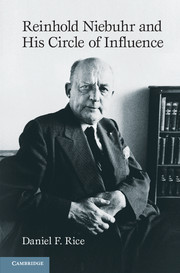Book contents
- Frontmatter
- Contents
- Acknowledgments
- Introduction
- Chapter 1 Paul Tillich (1886–1965)
- Chapter 2 John Dewey (1859–1952)
- Chapter 3 Norman Thomas (1884–1968)
- Chapter 4 Arthur Schlesinger Jr. (1917–2007)
- Chapter 5 Hans Morgenthau (1904–1980)
- Chapter 6 George Kennan (1904–2005)
- Chapter 7 Felix Frankfurter (1882–1965)
- Afterword
- Index
- References
Chapter 2 - John Dewey (1859–1952)
Published online by Cambridge University Press: 05 November 2012
- Frontmatter
- Contents
- Acknowledgments
- Introduction
- Chapter 1 Paul Tillich (1886–1965)
- Chapter 2 John Dewey (1859–1952)
- Chapter 3 Norman Thomas (1884–1968)
- Chapter 4 Arthur Schlesinger Jr. (1917–2007)
- Chapter 5 Hans Morgenthau (1904–1980)
- Chapter 6 George Kennan (1904–2005)
- Chapter 7 Felix Frankfurter (1882–1965)
- Afterword
- Index
- References
Summary
John Dewey was the most well-known and respected liberal voice in America throughout the early twentieth century. Born in 1859, the year Charles Darwin published The Origin of Species, Dewey was Niebuhr’s senior by a full generation. The American historian Henry Steele Commager accurately characterized Dewey as a “pioneer in educational reform, organizer of political parties, counselor to statesmen, champion of labor, of women’s rights, of peace, of civil liberties [and] interpreter of America abroad [having] illustrated in his own career how effective philosophy could be in that reconstruction of society which was his preoccupation and its responsibility.” However critical Niebuhr became of Dewey, he always admired and shared Dewey’s role as a public intellectual. Niebuhr saw Dewey as the preeminent American philosopher, and in his review of the book Living Philosophers: A Series of Intimate Credos, Niebuhr pointed out that among those mentioned only “John Dewey and Lewis Mumford both give themselves constructively to the social problem.” In his estimation of Dewey, what Niebuhr chose to emphasize was Dewey’s membership among that rare breed of philosophers willing to “descend from their ant-hill of scholastic hairsplitting to help the world of men regulate its common life and discipline its ambitions and ideals.”
Although the relationship between Niebuhr and Dewey was one of the most interesting in twentieth-century American intellectual history, the two men had little personal contact outside of their common involvement with various political activities during the late 1920s and 1930s. They did share political causes and occasional forums with the socialist Norman Thomas and were actively involved in support of Thomas’s presidential bid in 1932 – the same year Niebuhr himself was conducting a failed run for Congress from his own home district in New York. Both men were members of the League for Independent Political Action in company with University of Chicago economist and future United States Senator from Illinois Paul Douglas – an organization in which Dewey served as chairman for five years.
- Type
- Chapter
- Information
- Reinhold Niebuhr and His Circle of Influence , pp. 46 - 79Publisher: Cambridge University PressPrint publication year: 2012

